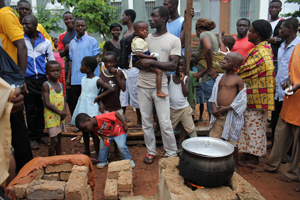 Creativity, ingenuity, flexibility and sensitivity are just some of the important virtues students from the Cockrell School of Engineering and School of Social Work realized were critical to the success of their projects this summer in Ghana. The students' work in Patriensa, Ghana was the culminating phase of the Cockrell School's Projects for Underserved Communities (PUC) course sequence.
Creativity, ingenuity, flexibility and sensitivity are just some of the important virtues students from the Cockrell School of Engineering and School of Social Work realized were critical to the success of their projects this summer in Ghana. The students' work in Patriensa, Ghana was the culminating phase of the Cockrell School's Projects for Underserved Communities (PUC) course sequence.
Now in its third year, PUC offers students opportunities to conduct engineering and construction projects in real-world settings. This year's projects in Ghana included installing sustainable solutions for cooking stoves and a water pump and filtration system.
"As engineers, we are very focused on the technical aspects of a project, but may not have the communication skills and cultural awareness to interact effectively with our community partners," said Janet Ellzey, vice provost for International Programs and professor in the Department of Mechanical Engineering. "We realized early on we needed a broad base of skills to be successful. We created a great partnership with the School of Social Work."
Students discovered in real time that while a certain technology or material was ideal from a function standpoint, it might not be the best solution for other reasons, whether it was cultural, financial or maintenance.
"Our plan on the stove project was to use cement blocks or bricks to build the structures and use briquettes for fuel," said O.A. Ezekoye, professor in the Department of Mechanical Engineering and technical adviser of the Sawdust Initiative Team. "That all changed once we learned how inexpensive and available sawdust was as a fuel source. The students acted on this and drove our solution."
Student project leader Clint Hanna explained that once the team committed to the more efficient solution of sawdust cook stoves, "we spent two months (at UT) preparing for the trip, testing the new stove design, heat output and acceptable emissions both outdoors behind the engineering building and in Dr. Ellzey/s lab under a fume hood."
The students were very satisfied with the project implementation, installing 30 stoves at homes in Patriensa during a two-week period. They also trained community members how to build more stoves.
"The potential of our project now rests largely on the shoulders of those relationships we built during our time in Ghana," Hanna said.
Social work graduate student Danielle Goldfarb produced a video that demonstrates how the sawdust stove initiative unfolded in Ghana.
Sachet Water Project
In addition to the stove team, another group of UT engineering and social work students carried out the Water Sachet Project in Patriensa at the same time.
"Our project involved designing septic, hydraulic and generator systems," said Kristina Baltazar, team project leader and aerospace engineering major. "One of our biggest challenges was determining available resources in the village as there were no local engineers for us to communicate with."
The project was a continuation of a previous PUC team's work and focused on finishing the construction and installation of the manufacturing facilities and hydraulic equipment of a community enterprise to produce and sell filtered drinking water sachets (small plastic bags) to generate revenue for the community.
"Being involved in PUC was a once in a lifetime experience for me. It combined my passions for engineering and community development," Baltazar said. "It was great to witness the impact of our project on the villagers. Seeing how thankful and happy everyone was made all of our hard work worth it."
About PUC
The PUC course was created several years ago by Ellzey and James O'Connor, C.T. Wells Professor in the Department of Civil, Architectural and Environmental Engineering. Support and consultation for the PUC programs is provided by Afren, an independent oil and gas company. Learn more about the PUC program.
Help Support PUC
PUC needs Cockrell School alumni support in various ways: as program advisors; through frequent flyer miles for student travel; or program donations. Please contact







